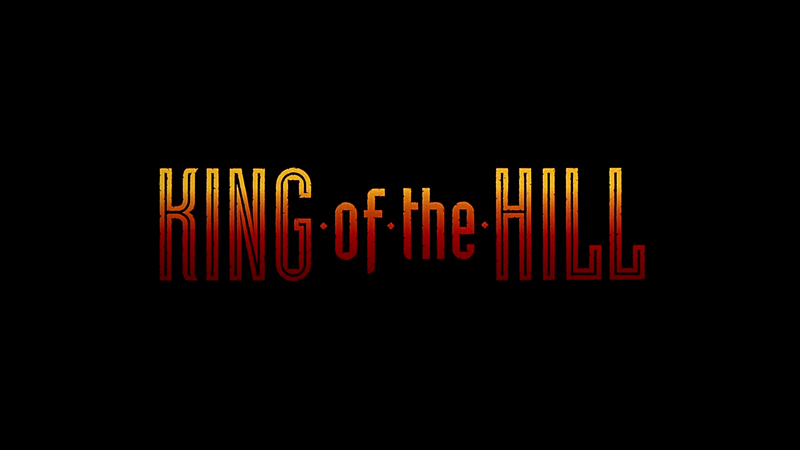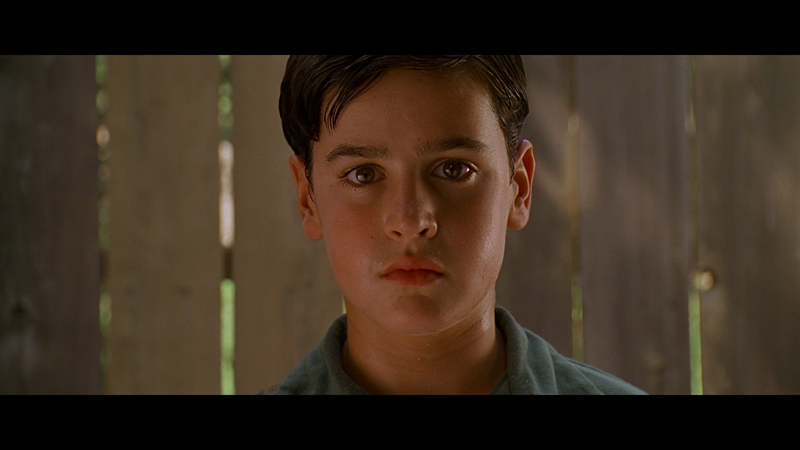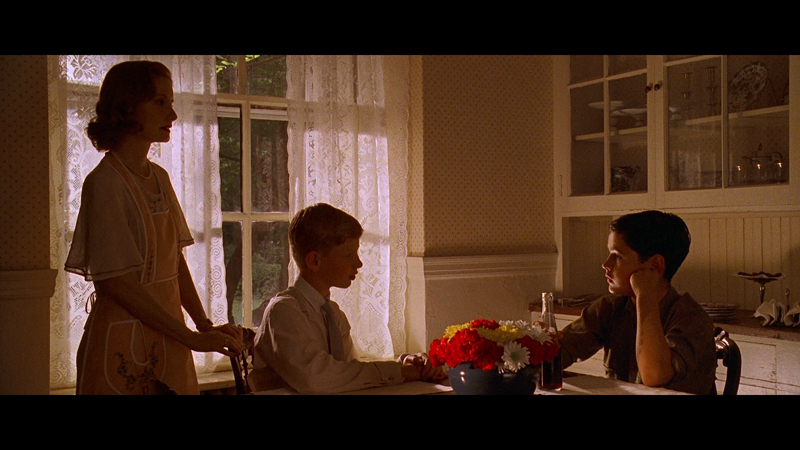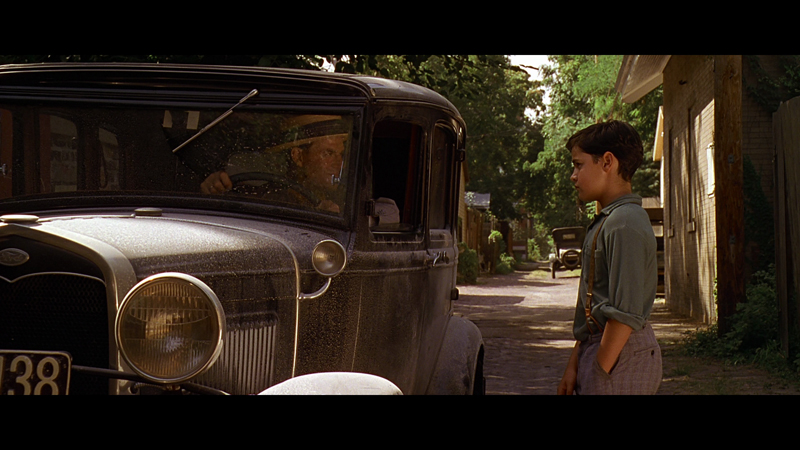| Reviews & Columns |
|
Reviews DVD TV on DVD Blu-ray 4K UHD International DVDs In Theaters Reviews by Studio Video Games Features Collector Series DVDs Easter Egg Database Interviews DVD Talk Radio Feature Articles Columns Anime Talk DVD Savant Horror DVDs The M.O.D. Squad Art House HD Talk Silent DVD
|
DVD Talk Forum |
|
|
| Resources |
|
DVD Price Search Customer Service #'s RCE Info Links |
|
Columns
|
|
|
King of the Hill
Soderbergh looks back at the Depression

Loves: Steven Soderbergh, Criterion Collection, Spalding Gray
Likes: Jesse Bradford
Dislikes: Historical films
Hates: Kids in trouble
The Movie
Often, when people discuss Steven Soderbergh, they either start with Out of Sight, jump through his biggest hits like Erin Brockovich and Ocean's Eleven before landing on one of his late-career films, including The Informant! or Magic Mike, or they start with his indie breakout sex, lies and videotape and then move through quirky experiments like Schizopolis and Bubble. However, most won't mention his run of films after his breakthrough and before he became bankable, a series of films that allowed him to find his voice and try some new things. Chief among them is the A.E. Hotchner adaptation King of the Hill, a Depression-era coming-of-age story that showed Soderbergh could marry traditional storytelling with style and edge, and introduced a major young talent in Jesse Bradford.
Bradford plays Aaron, a bright, imaginative young boy living in St. Louis in 1933. A star student, he has to overcome a tremendous deal to keep his grades up, not the least of which is the fact that he doesn't live in the district in which he attends school. Rather, he lives in an old hotel in the city, with his down-on-his-luck salesman father, his oft-ill mother and his troublemaking little brother Sullivan. The down economy is affecting everyone, and one after another, the residents of the hotel are being tossed out for not paying the bills. With times tight, Aaron's little brother is sent away to live with an uncle, his mother ends up in a sanitarium with tuberculosis and his father takes a job a few states over. Left home alone, Aaron has to find a way to survive when it seems everyone is out to get him, with the exception of Lester (Adrian Brody), an older guy who looks out for him like a little brother.

Soderbergh, with the help of collaborators like cinematographer Elliot Davis and music chief Cliff Martinez, crafted an enveloping sense of atmosphere in this film, a sticky, amber-hued world that feels as hot and old-school as intended for these characters. Though frequently sentimental, particularly when it comes to Aaron and Lester's "Our Gang"-like misadventures, it can also be quite dark. Gray's character talks over Aaron's head, allowing the audience to know what's happening, while keeping the innocent child in the dark, until his world comes into rather sudden stark light. Aaron's suffering is quite depressing, and it says a lot about Soderbergh that he doesn't attempt to give the film a Hollywood ending, even if some might think it's there. The gorgeously evocative photography captures a cast of consummate professionals, including Katherine Heigl's first second-ever film role, a part that shows she hasn't aged much in the past 20-plus years. Everything about this movie has a level of polish, with a subversive undercurrent beneath it, that signalled the arrival of one of modern film's most prolifically outstanding filmmakers.

The Discs
King of the Hill arrives on three discs, two DVDs and one Blu-Ray, which are held in a two-tray, two-panel digipak, inside a cardboard slipcase which also contains the accompanying booklet. (Criterion's move to dual-format release has helped raise its game in terms of packaging.) The DVDs are overlapped on two hubs on the left side of the case, while the Blu-ray sits on the other side. The ever-classy Criterion menu gives the choice to watch the film, navigate the timeline, select scenes and check out the special features. There are no audio options, while subtitles are available in English. Once again, Criterion has provided all the extra material in both formats, which required a second DVD.
The Quality
The 2.35:1, 1080p, AVC-encoded transfer arrives courtesy of a new 2K digital transfer supervised by Soderbergh. Surprisingly, Criterion doesn't mention anything in the way of a restoration effort, because the image looks tremendous, loaded with fine detail that capture the incredible texture in the film and boasting excellent color that reproduces the warm tones gorgeously. The video is sharp and free of any noticeable concerns or digital distractions. Just a wonderful looking movie all around.
The 5.1 DTS-HD Master Audio track is strong and clear, though the film leans toward the quiet side, made up mainly of dialogue, with some occasional atmospheric effects. The score and soundtrack gets some enhancement in the surrounds though, keeping the sound active throughout, even if it's not exactly a dynamic mix.
The Extras
Though there's not the usual Soderbergh commentary (the man has done more commentaries than perhaps any director this side of Kevin Smith), we do get a new 19:25 interview, where he shares his memories of the film, along with some analysis, putting it in context with the rest of his work. He also covers the challenges and elements of adaptation, the casting of Bradford, the film's aspect ratio and length and his early efforts. Though he covers a lot of topics, this couldn't be long enough, as few people are as interesting to listen to as they discuss film.
The disc also gives us the perspective of the source material's author, as Hotchner sits down for a 21:10 interview that kicks off with his reading a passage from his book. From there, he talks a bit about the book's voice. his memories of the stories depicted in the film, his connection to the production (including some hands-on tutoring) and the power of books. Yet another example of how Criterion expands the world of the films it presents.
In his interview, Soderbergh makes reference to the film's length and some scenes he cut, six of which are available to watch either separately or in a 8:47 block. These are in very rough, full-frame shape, and nothing really would have added to the film, though it's amusing to see the boom mic visible in several shots (though one assumes that cropping would have cleaned that up.)
Much more interesting is Against Tyranny, a 10:39 visual essay by ::kogonada that breaks down how Soderbergh uses an "editing grammar" to break away from traditional narrative structure, utilizing examples mainly from King of the Hill and one of my favorite Soderbergh films, Schizopolis. Quickly and beautifully, ::kogonada shows how Soderbergh's editing follows a rhythm and then breaks that rhythm to achieve a specific effect. The only issue here, if any, is grabbing onto a continuity error caused by a likely editing decision as evidence of Soderbergh dismissing linear narrative. An unlikely reach, but it doesn't take away from the rest of the piece.
Aside from a rough-looking full-frame trailer for the film (2:31), that's all the extras included for King of the Hill. That's not all the extras though, as Criterion has included Soderbergh's next feature, The Underneath, in 1080p, AVC-encoded, 5.1 DTS-HD Master Audio quality. A crime drama told in non-linear fashion, the film stars Peter Gallagher as a gambler whose debts force him into deals he shouldn't make. The cast offer up quite a few quality performances, including Elisabeth Shue, William Fichtner and the great Joe Don Baker, while the film features many of the touches that would later be used to greater effect by Soderbergh, like the color treatments seen in Traffic, but The Underneath just doesn't come together the same way many of his other creations do, often feeling like it's meandering.
Interestingly, Criterion had Soderbergh sit down to do a 22:33 interview about this film as well, and the director does not hold back, dismissing the movie and explaining why he feels the way he does, putting the film in a personal and professional context that's hugely enlightening for film fans. He also points out what he likes and what the film means in the big picture for himself, including techniques he developed and inspiration he took, as well as explaining the movie's relationship to Waterworld and his own epic Che. It's a rare man who can admit his own mistakes, and then learn from them. Wrapping up the extras for The Underneath is another aged trailer (2:05) that shows too much of the finished film.
As is the norm for Criterion, a beautiful booklet (a 42-pager this time) is included with this set, featuring a commentary on the film's themes from author Peter Tonguette, a 1993 interview with Soderbergh by French film magazine Positif and an excerpt from Hotchner's book, The Boyhood Memories of A.E. Hotchner, along with the usual details about the set. Of the three, the interview with Soderbergh is easily the most interesting, largely because of the 20 years that have passed since it took place, which give perspective to the answers he gives. The excerpt is welcome though, as you get an idea of the source material Soderbergh was working with.

The Bottom Line
Soderbergh's directing career is pretty neatly divided into three phases: his early feeling-out stage, his crowd-pleasing prime and his anything-goes third act. The first part is far less well-known than the others, but this Criterion release goes a long way toward fixing that by delivering two early and highly disparate films from Soderbergh's filmography in high quality, with an additional dose of quality bonus features. Though The Underneath doesn't stack up, it does serve as a valuable part of an education in the Soderbergh canon, while King of the Hill is an underrated classic.
Francis Rizzo III is a native Long Islander, where he works in academia. In his spare time, he enjoys watching hockey, writing and spending time with his wife, daughter and puppy.Follow him on Twitter
*The Reviewer's Bias section is an attempt to help readers use the review to its best effect. By knowing where the reviewer's biases lie on the film's subject matter, one can read the review with the right mindset.
|
| Popular Reviews |
| Sponsored Links |
|
|
| Sponsored Links |
|
|
| Release List | Reviews | Shop | Newsletter | Forum | DVD Giveaways | Blu-Ray | Advertise |
|
Copyright 2024 DVDTalk.com All Rights Reserved. Legal Info, Privacy Policy, Terms of Use,
Manage Preferences,
Your Privacy Choices | |||||||














